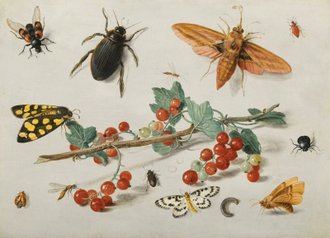Gospel in Art: Moths and woodworms destroy earthly treasures

A sprig of redcurrants with insects, by Jan van Kessel I,1657 © Sotheby's London, 3 December 2014, lot 36 (one of a pair), sold £542,000
Source: Christian Art
Gospel of 21 June 2024
Matthew 6:19-23
Jesus said to his disciples: 'Do not store up treasures for yourselves on earth, where moths and woodworms destroy them and thieves can break in and steal. But store up treasures for yourselves in heaven, where neither moth nor woodworms destroy them and thieves cannot break in and steal. For where your treasure is, there will your heart be also.
'The lamp of the body is the eye. It follows that if your eye is sound, your whole body will be filled with light. But if your eye is diseased, your whole body will be all darkness. If then, the light inside you is darkness, what darkness that will be!'
Reflection on the painting
Our painting on copper panel was executed in 1657 by Jan van Kessel. He is known for painting insects and fruit with meticulous detail. A wide array of insects, systematically placed and ordered, is carefully painted and seems to float on the surface, the effect achieved by the shadows underneath the insects. The juxtaposition of Van Kessel's animated insects and the redcurrants and two moths delights the viewer. There is a certain cheerfulness that emanates from these paintings. Yet the message is profound: the animals and fruit depicted are fleeting, here one day, gone the next.
During the 17th century there was a flourishing interest in collecting cabinets of curiosities. These encyclopaedic collections of natural objects, insects, flowers, animals and stones were regarded as a microcosm of the world: Nature and Creation summarised in a cabinet. A painting such as the one we see today could have fronted a drawer of one of those cabinets of curiosities.
So Jesus mentions moths and woodworms in our reading today. Moths eat away at the most exquisite textiles; woodworms wind their way through the most beautiful of woods. Jesus uses these images to invite us to a perfect detachment from all things. He warns us against storing up treasures on earth: they don't last, and we can't take anything with us when we leave these earthly shores.
After the death of John D Rockefeller, one of the wealthiest men of his time, someone asked his accountant: 'How much money did John leave?' The accountant simply answered: 'He didn't take any of it with him, he left ... all of it.'
LINKS
Gospel in Art: https://christian.art/
Today's Reflection: https://christian.art/daily-gospel-reading/matthew-6-19-23-2024/


















